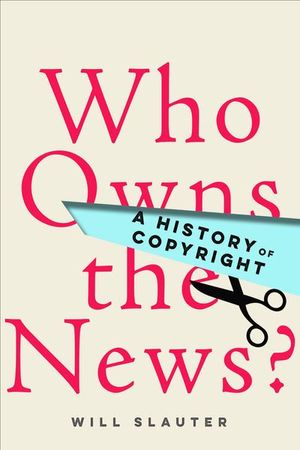Who Owns the News?
Published by Stanford University Press
Can a free press survive in an era of free content? An “entertaining and well-written” examination of copyright law, its history, and its purpose (New York Law Journal).
You can’t copyright facts, but is news a category unto itself? Without legal protection for the “ownership” of news, what incentive does a news organization have to invest in producing quality journalism that serves the public good? Can a free press survive in the era of free content?
This book explores the intertwined histories of journalism and copyright law in the United States and Great Britain, revealing how shifts in technology, government policy, and publishing strategy have shaped the media landscape. Publishers have long sought to treat news as exclusive to protect their investments against copying or “free riding.” But over the centuries, arguments about the vital role of newspapers and the need for information to circulate have made it difficult to defend property rights in news. Beginning with the earliest printed news publications and ending with the Internet, Will Slauter traces these countervailing trends, offering a fresh perspective on debates about copyright and efforts to control the flow of news.
“A well-written, thoughtful book, demonstrating how copyright law has struggled to keep up with the development of news culture, setting out the historical context in great detail and supported by much research, and with interesting conclusions and predictions for the future. It is unreservedly recommended.” ––European Intellectual Property Review
You can’t copyright facts, but is news a category unto itself? Without legal protection for the “ownership” of news, what incentive does a news organization have to invest in producing quality journalism that serves the public good? Can a free press survive in the era of free content?
This book explores the intertwined histories of journalism and copyright law in the United States and Great Britain, revealing how shifts in technology, government policy, and publishing strategy have shaped the media landscape. Publishers have long sought to treat news as exclusive to protect their investments against copying or “free riding.” But over the centuries, arguments about the vital role of newspapers and the need for information to circulate have made it difficult to defend property rights in news. Beginning with the earliest printed news publications and ending with the Internet, Will Slauter traces these countervailing trends, offering a fresh perspective on debates about copyright and efforts to control the flow of news.
“A well-written, thoughtful book, demonstrating how copyright law has struggled to keep up with the development of news culture, setting out the historical context in great detail and supported by much research, and with interesting conclusions and predictions for the future. It is unreservedly recommended.” ––European Intellectual Property Review
BUY NOW FROM
COMMUNITY REVIEWS

